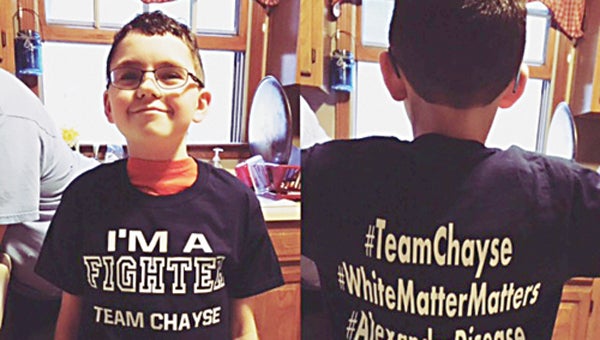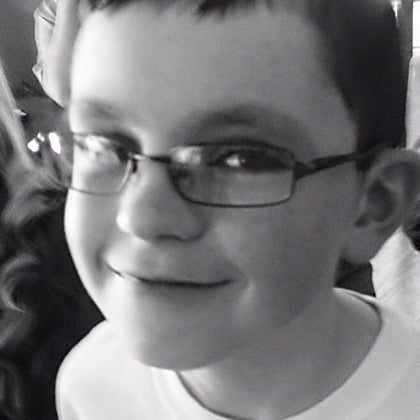Hampton teen diagnosed with globally rare, fatal disease
Published 8:03 am Saturday, April 23, 2016

Contributed Photo Chayse Andrews is a fighter. Though diagnosed with a rare, fatal disease that is already taking its toll, he wears a smile.
Because Alexander Disease has only been diagnosed in approximately 500 children globally since its discovery in 1949 (U.S. National Library of Medicine), most people don’t understand the importance of white matter in the brain.
A Hampton teen, Chayse Andrews, and his family are learning all too quickly the importance of white matter, as he was diagnosed with fibrinoid leukodystrophy, commonly called Alexander Disease, on March 11 at Vanderbilt University Medical Center.
“We don’t know how it will affect him,” his mother Kristal said. “You don’t know the rate of progression.”
The 12-year-old had struggled for years with difficulty eating, but his mother said that about a year ago, his anxiety began to worsen.
“He’s been going back and forth to the doctor for eating problems for a long time, and he has really bad anxiety and panic attacks, which we know now is probably from this,” Kristal said. “When he has a really bad panic attack, he passes out. He passed out and hit his head, so we took him to the hospital, and they did a CT scan. That’s where they saw it may be Alexander Disease.”
Then, at Vanderbilt, they had genetic testing done which confirmed the disease. Kristal said it affects a person similarly to amyotrophic lateral schlerosis (ALS), but it can also attack mental abilities. Symptoms of Alexander Disease vary based on age of onset, though they are similar in infant, juvenile and adult stages. The disease is not contagious and is very rarely genetically inherited, according to the United Leukodystrophy Foundation.
“It affects the white matter in the brain,” Kristal explained. “We all have a myelin sheath (white matter) around the nerves, and that protects nerves, but this disease attacks that sheath and deteriorates them, so the nerves kind of go haywire.”
Though Chayse is already noticeably affected by the fatal disease, she said they cannot predict how it will progress.
“They lose ability to do things they’ve always known how to do, it has physical affects, but it also impairs their ability to read, write, talk, walk and eat,” she said.
Chayse eats nearly all of his meals through a feeding tube now, Kristal said. He also has homebound education, where a teacher comes to his home to teach him. He is mobile and has been attending physical therapy three times weekly as well, which his mother said have been very helpful.
“We started that now to get ahead of the game,” she said. “We thought if we could keep him moving, it wouldn’t hit him as hard later.”
One of the issues in battling a rare disease, she said, is the awareness and funding for research do not compare to that of the funding and awareness for more prominent diseases.
“So pharmaceutical companies don’t want to invest in research with it only affecting a few people,” Kristal said. “We’re trying to raise awareness of the disease so that research can progress.”
She said one organization, Elise’s Corner, has been fundraising for this cause. She hopes to raise support for that organization, as well as for her family’s expenses for travel, doctor visits, tests and medical equipment.
“He gets formula every month and has a feeding pump and there’s travel back and forth to Vanderbilt — it’s a lot,” she said.
He will likely have to get a wheelchair at some point and will incur a variety of expenses in their upcoming visit to the Children’s Hospital of Philadelphia (CHOP).
“No one here has been diagnosed,” she said. “The Vanderbilt people were not real familiar either. The doctor said she’s only treated one or two people with it, but the doctor in Philadelphia sees them all the time. I think she’s the only one even remotely close to us.”
Amy Waldman, pediatric neurologist and medical director of the CHOP Leukodystrophy Center, has seen numerous cases of Alexander Disease, and for this reason, the Andrews have scheduled a three-day visit with her in May.
Kristal said their options locally would be very limited and would likely reduce the quality of treatment for Chayse if they could not go to CHOP.
“Around here, they would be guessing at how to treat him because nobody is familiar with it,” she said. “It would just be treating symptoms instead of being ahead of the game. None of the neurologists close to home have ever dealt with it.”
Kristal and her husband Greg hope the resources and experience of the personnel at CHOP will improve Chayse’s quality and years of life.
“It is a fatal disease,” she said. “He may go a decade, we just don’t know.”
Until that appointment with the CHOP leukodystrophy clinic, they plan to raise awareness and funding both for their family and for research on the disease as a whole.
“If people don’t want to donate to us, they could donate to Elise’s Corner, because that goes to a research fund for Alexander Disease,” Kristal said. “From what I’ve heard, they are on the verge of treatment, but there’s not enough funding and not enough people registered, so we’re trying to raise money to help find a cure.”
The family has been impacted by the realities of the disease in a number of ways already. On top of the medical and travel expenses, Kristal just received her registered medical assistant certificate, but is unable to work because she must be home to care for Chayse.
In addition, she said his anxiety and panic attacks are really bad when transitioning from place to place, so simply leaving the house can be very difficult. Chayse has two brothers whose lives are impacted as well.
“He has balance issues, so he doesn’t like to wrestle around with his dad and brothers like he used to because he thinks he’s going to fall,” Kristal said.
Members of the Hampton community have banded together to host fundraiser events for the Andrews family. The next event is a motorcycle ride on Saturday, April 23 beginning at Hampton High School. Registration will begin at 9:30 a.m. and the ride will leave at 11 :30 a.m. Kristal said all motor vehicles are welcome to join.
The ride will go around Watauga Lake, through Boone and back to Hampton through Roan Mountain. The cost is $20 for individuals or $30 for doubles to participate and includes a lunch provided at Little Doe Freewill Baptist Church around 2:30 p.m. If folks can’t make the race, Kristal said they are welcome to join lunch at the church, where there will be a raffle.
Those that would like to support the family’s expenses may donate to an account at Carter County Bank under the names Kristal and Greg Andrews. She said be sure to specify it is the newer account.
To follow Chayse’s journey or to learn more about the ride, visit Team Chayse or Ride for Chayse on Facebook. To make a donation to Elise’s Corner, visit www.elisescorner.org.
“We have had a lot of support already,” Kristal said. “The Hampton community has really come together and helped us a lot. Everybody loves Chayse. He’s very outgoing; at basketball games at half time, he’ll get out and dance. Our community has really come together for him, and for that, we are grateful.”




